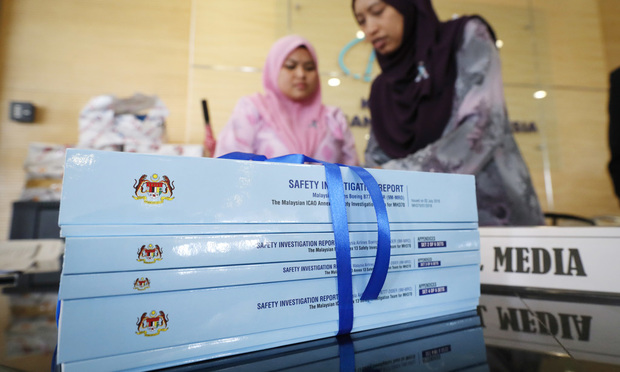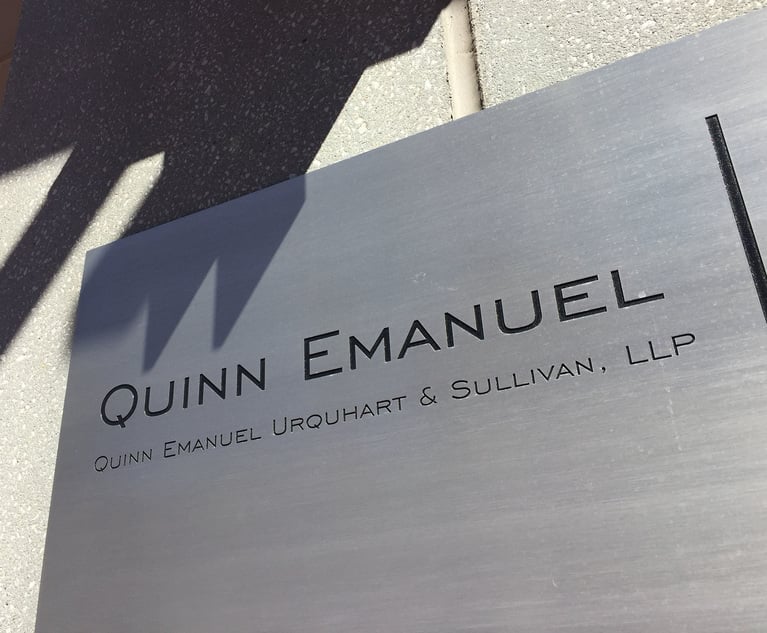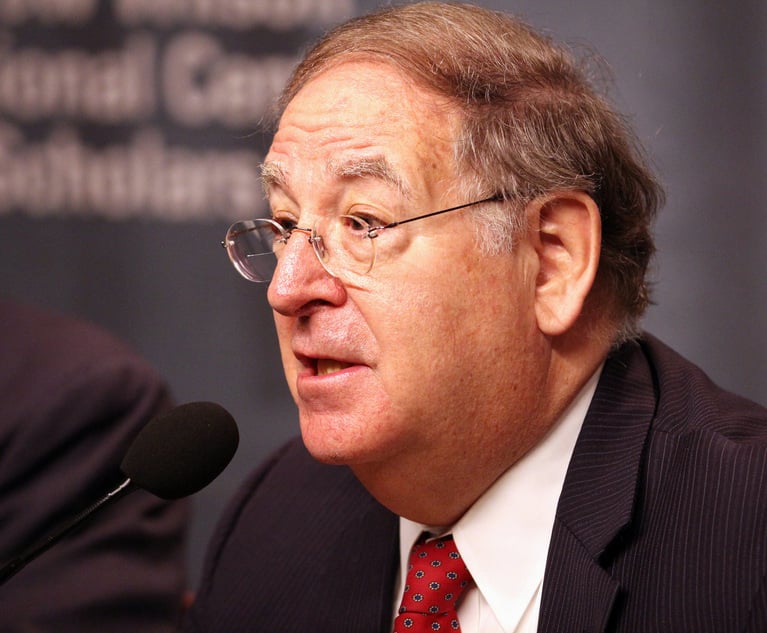Boeing, in Bid to Dismiss Suits, Says Final Report Over Malaysia Air Flight 370 Found No Defect
Boeing argued this week that a final report into the disappearance of Malaysia Air Flight 370 supports its bid to dismiss dozens of lawsuits brought in U.S. courts on behalf of the families of deceased passengers.
August 02, 2018 at 05:06 PM
5 minute read
 Staffs arrange the copies of the final investigation report on missing flight MH370 in Putrajaya, Malaysia, on July 30, 2018. Photo: Vincent Thian/AP
Staffs arrange the copies of the final investigation report on missing flight MH370 in Putrajaya, Malaysia, on July 30, 2018. Photo: Vincent Thian/AP
Boeing argued this week that a final report into the disappearance of Malaysia Air Flight 370 supports its bid to dismiss dozens of lawsuits brought in U.S. courts on behalf of the families of deceased passengers.
The report, released on Monday by a Malaysia-based international group of government investigators, failed to identify exactly what happened to the doomed Boeing 777, which disappeared over the Indian Ocean in 2014 along with 239 passengers and crew members. But on Wednesday, Boeing filed a notice in court referencing the 495-page report, which pointed to “the possibility of intervention by a third party” and found no evidence of “a mechanical malfunction with the aircraft's airframe, control systems, fuel or engines.”
“Given the known actions and status of the aircraft in its flight, the investigators could posit no plausible defect or system failure that would have the aircraft operating as it did,” wrote attorney Mack Shultz of Seattle's Perkins Coie for Boeing. “Conversely, the investigators concluded that key portions of the event could only result from human input. The report also notes actions by third parties, such as the air traffic controllers, that significantly impacted the ability to locate the aircraft.”
Shultz declined to comment.
Plaintiffs attorney Steven Marks of Podhurst Orseck in Miami insisted the report doesn't change his lawsuits, most of which name Boeing as a defendant.
“There's nothing in the report that would suggest that Malaysia Air is free from fault,” he said. “It doesn't mean that Boeing is off the hook, at all.” He cited the 1997 SilkAir crash of a Boeing 737 in Indonesia that killed 104 people aboard. The U.S. National Transportation Safety Board's findings were inconclusive, but a jury found the aircraft was defective and awarded more than $40 million against hydraulic equipment manufacturer Parker Hannifin Corp.
Another plaintiffs attorney in the case, Mary Schiavo of Motley Rice in Mount Pleasant, South Carolina, and Malaysian Airlines lawyer Richard Walker, a member of Chicago's Kaplan, Massamillo & Andrews, did not respond to requests for comment.
Flight 370's disappearance has become one of the greatest aircraft mysteries since Amelia Earhart's plane vanished in 1937. The flight took off from Kuala Lampur, Malaysia, on March 8, 2014, headed to Beijing, China. Minutes later, the plane made an abrupt turnaround, flying seven hours into the Indian Ocean.
Some parts of the plane were recovered, but the wreckage site remains unknown despite two exhaustive searches. Investigators have cleared both the passengers and the crew as potential terrorists and found no evidence that the pilot or first officer committed suicide.
A report by Australian authorities concluded that the plane ran out of fuel and plunged into the ocean. In this week's report, Malaysian authorities found someone was in control of the aircraft after the pilot signed off with air traffic controllers.
Most of the 227 passengers were from China. Under the Montreal Convention, an international treaty from 1999, passengers from foreign countries can't sue a foreign airline in U.S. courts, which offer significantly higher damage awards, unless they purchased their tickets or had final destinations in the United States.
But plaintiffs lawyers have brought various theories on behalf of about 70 passengers. They have argued that some of the passengers were U.S. citizens or worked abroad but had a “principal and permanent residence” in the United States or bought tickets through U.S. travel agencies, such as Orbitz.
Motley Rice's Schiavo has brought novel claims targeting Allianz Global Corporate and Specialty, the insurer for Malaysia Airlines, under Article 32 of the Montreal Convention. That provision states: “In the case of the death of the person liable, an action for damages lies in accordance with the terms of this convention against those legally representing his or her estate.” Those cases identify Malaysia Airlines as a dead “person” whose legal representative is now Allianz. Malaysia Airlines restructured following Flight 370's disappearance and began rejecting claims, arguing it wasn't the same company as its former entity.
Malaysia Airlines and Boeing have moved to dismiss the cases, which should be in Malaysia.
Following oral arguments on Dec. 19, lawyers have been waiting on U.S. District Judge Ketanji Brown Jackson of the District of Columbia to rule on their motions to dismiss. Both sides submitted updates on the Malaysian report, disagreeing about whether its findings would be relevant.
“The final report tips the scales even further because the evidence evaluated in the Malaysian investigation confirms the potential liability of third parties that cannot be part of U.S. proceedings,” Shultz wrote in this week's notice for Boeing.
This content has been archived. It is available through our partners, LexisNexis® and Bloomberg Law.
To view this content, please continue to their sites.
Not a Lexis Subscriber?
Subscribe Now
Not a Bloomberg Law Subscriber?
Subscribe Now
NOT FOR REPRINT
© 2025 ALM Global, LLC, All Rights Reserved. Request academic re-use from www.copyright.com. All other uses, submit a request to [email protected]. For more information visit Asset & Logo Licensing.
You Might Like
View All
Quinn Emanuel Files Countersuit Against DOJ in Row Over Premerger Reporting
3 minute read
'Thoughtful Jurist': Maryland US District Senior Judge Messitte Dies After Short Illness
4 minute read
'Religious Discrimination'?: 4th Circuit Revives Challenge to Employer Vaccine Mandate
2 minute read
4th Circuit Revives Racial Harassment Lawsuit Against North Carolina School District
3 minute readTrending Stories
- 1The 'Substantial Certainty' of Employer Liability Policies
- 2Morgan Lewis Shutters Shenzhen Office Less Than Two Years After Launch
- 3Litigating the Written Word: Parol Evidence Rule and the Gist of the Action Doctrine in Fraud Claims
- 4Why Wait? Arbitrate! The Value of Consenting to Arbitrate Your SUM Cases at NAM
- 5The Legal Status of Presidential Diaries Must Be Clarified
Who Got The Work
J. Brugh Lower of Gibbons has entered an appearance for industrial equipment supplier Devco Corporation in a pending trademark infringement lawsuit. The suit, accusing the defendant of selling knock-off Graco products, was filed Dec. 18 in New Jersey District Court by Rivkin Radler on behalf of Graco Inc. and Graco Minnesota. The case, assigned to U.S. District Judge Zahid N. Quraishi, is 3:24-cv-11294, Graco Inc. et al v. Devco Corporation.
Who Got The Work
Rebecca Maller-Stein and Kent A. Yalowitz of Arnold & Porter Kaye Scholer have entered their appearances for Hanaco Venture Capital and its executives, Lior Prosor and David Frankel, in a pending securities lawsuit. The action, filed on Dec. 24 in New York Southern District Court by Zell, Aron & Co. on behalf of Goldeneye Advisors, accuses the defendants of negligently and fraudulently managing the plaintiff's $1 million investment. The case, assigned to U.S. District Judge Vernon S. Broderick, is 1:24-cv-09918, Goldeneye Advisors, LLC v. Hanaco Venture Capital, Ltd. et al.
Who Got The Work
Attorneys from A&O Shearman has stepped in as defense counsel for Toronto-Dominion Bank and other defendants in a pending securities class action. The suit, filed Dec. 11 in New York Southern District Court by Bleichmar Fonti & Auld, accuses the defendants of concealing the bank's 'pervasive' deficiencies in regards to its compliance with the Bank Secrecy Act and the quality of its anti-money laundering controls. The case, assigned to U.S. District Judge Arun Subramanian, is 1:24-cv-09445, Gonzalez v. The Toronto-Dominion Bank et al.
Who Got The Work
Crown Castle International, a Pennsylvania company providing shared communications infrastructure, has turned to Luke D. Wolf of Gordon Rees Scully Mansukhani to fend off a pending breach-of-contract lawsuit. The court action, filed Nov. 25 in Michigan Eastern District Court by Hooper Hathaway PC on behalf of The Town Residences LLC, accuses Crown Castle of failing to transfer approximately $30,000 in utility payments from T-Mobile in breach of a roof-top lease and assignment agreement. The case, assigned to U.S. District Judge Susan K. Declercq, is 2:24-cv-13131, The Town Residences LLC v. T-Mobile US, Inc. et al.
Who Got The Work
Wilfred P. Coronato and Daniel M. Schwartz of McCarter & English have stepped in as defense counsel to Electrolux Home Products Inc. in a pending product liability lawsuit. The court action, filed Nov. 26 in New York Eastern District Court by Poulos Lopiccolo PC and Nagel Rice LLP on behalf of David Stern, alleges that the defendant's refrigerators’ drawers and shelving repeatedly break and fall apart within months after purchase. The case, assigned to U.S. District Judge Joan M. Azrack, is 2:24-cv-08204, Stern v. Electrolux Home Products, Inc.
Featured Firms
Law Offices of Gary Martin Hays & Associates, P.C.
(470) 294-1674
Law Offices of Mark E. Salomone
(857) 444-6468
Smith & Hassler
(713) 739-1250










